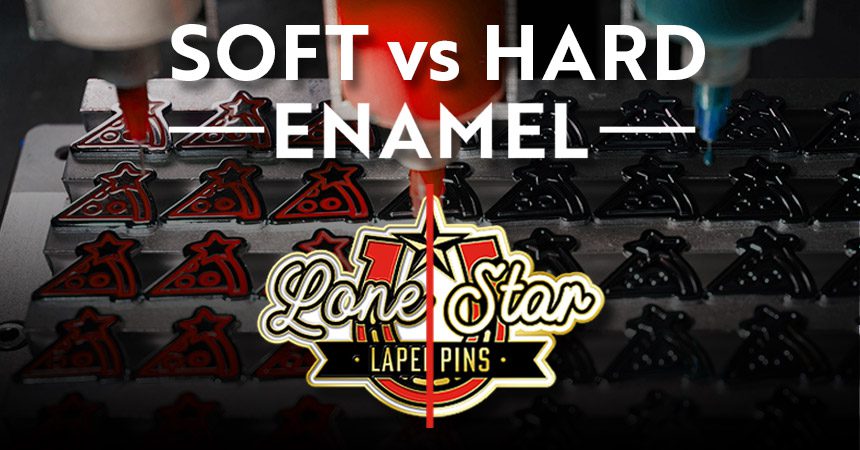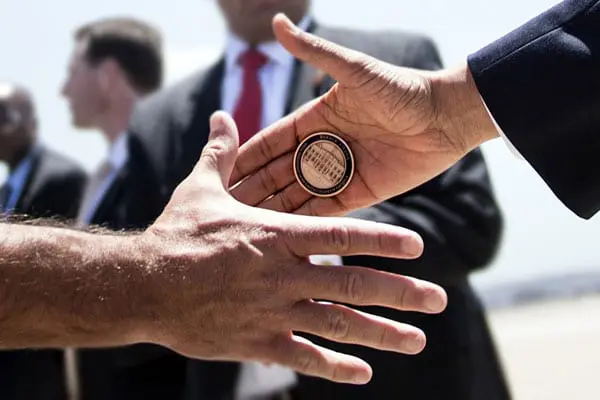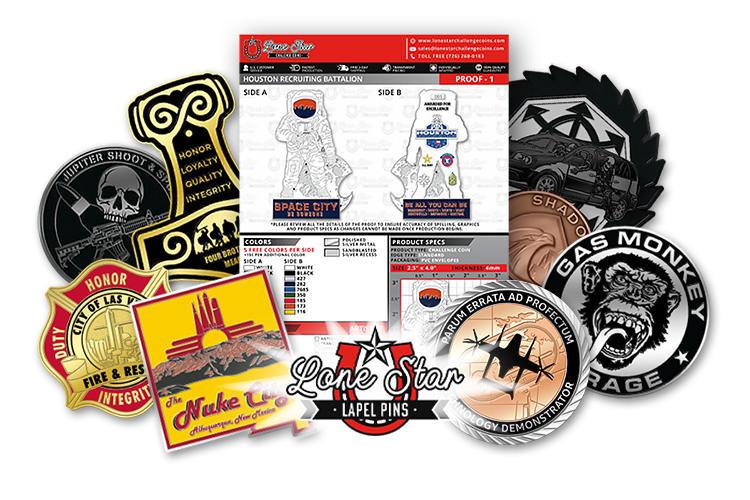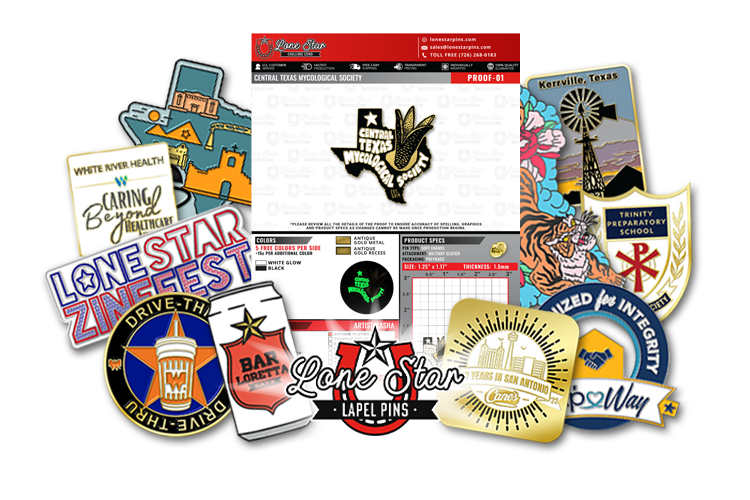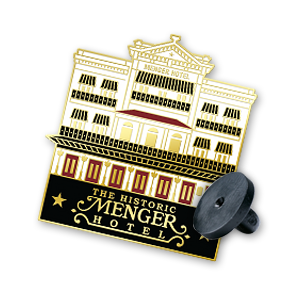Introduction
When creating custom pin designs, it’s helpful to understand the difference between soft enamel vs. hard enamel. Both enamel finishes have certain advantages and complement some strategies better than others. We’ll discuss some of these key differences so that you can make the most informed decision when designing your custom pins.
What is Enamel?
Before we get into hard enamel vs. soft enamel pins, we need to discuss the difference between paint and enamel. Technically, enamel is a type of paint, but it differs because it has specific protective properties that make it more durable. Enamel is heated in an oven so that, when it dries, it has a rugged, glossy surface. Enamel is water-resistant and mostly heat-resistant, too.
In addition, while paint can have a variety of bases, almost all enamels are oil-based. The best way to describe the difference between paint and enamel is how you’d tell the difference between a car and a Mercedes: not all cars are Mercedes, but all Mercedes are cars.
Soft Enamel vs Hard Enamel: What is the Difference?
Each style of enamel pin has a different finished look and its advantages and disadvantages. Only a few people know the intricate differences between the two and often debate the topic of hard vs. soft enamel pins when deciding which style they want for their custom-designed pins. First, let’s review a few critical differences between soft and hard enamel pins regarding manufacturing processes, durability, and customizability.
What is Soft Enamel?
As you read this article, you may ask yourself: What is soft enamel? Popular in music, anime, and art scenes, these die-struck metal pins have raised and recessed areas to separate and hold the various enamel colors. Because of this, the soft enamel pins have a bumpy texture that allows you to feel each individual groove.
Also known as “embossed enamel pins,” they are an excellent choice for many occasions, from event souvenirs, corporate brand identity, employee recognition, and baseball trading pins. Soft enamel pins are also more affordable, typically costing less than hard enamel pins. Lastly, soft enamel pins offer a few extra plating options that are not available with hard enamel pins.
The Pros and Cons of Soft Enamel
Since it’s less expensive than hard enamel, soft enamel is a solid choice for pin shoppers on a budget. That’s especially true if you’re buying in bulk. Soft enamel is also a good choice if you want your pin to have rainbow plating, colored metal plating (such as black metal, or antique plating. Unfortunately, the polishing process used in creating hard enamel pins can ruin these platings.
Other reasons to choose a soft enamel option for your custom pin design are higher levels of detailing and shorter production time. Because soft enamel pins aren’t polished like hard enamel pins, the metal lines are slightly thinner (because the peaks don’t get polished flat), resulting in sharper detailing. This means that soft enamel is the go-to option for highly detailed pin designs.
Soft Enamel is also a good choice if you’re in a rush and must have your pins delivered quickly. This is because they are colored only once and don’t need to be polished. The reduced labor time and cost are also why soft enamel is the cheaper of the two options.
What is Hard Enamel?
Hard enamel paint is created by filling the recessed areas of the pin to the top and then polishing it flat. This makes hard enamel pins heavier and more durable than their soft enamel counterparts. Though the polishing process makes the hard enamel pins have slightly thicker metal lines, it also creates a nice smooth surface.
The result is beautiful pins with added heft and a smooth, shiny surface. This gives them an elegant look and higher perceived value. So, hard enamel would be your best option if you’re looking for a more elegant-style pin. The one major drawback to the longer coloring process and added polishing step is that it takes longer to manufacture this style of enamel pin.
The Pros and Cons of Hard Enamel
If you don’t require antique, colored, or rainbow platings for your pin, this may be your style. Hard enamel works wonderfully with any polished plating. The most common platings used with hard enamel pins are polished gold and silver. However, you can also choose from polished copper, brass, nickel, or black nickel platings.
It’s also a good choice for people who want the most scratch-resistant pins possible, as hard enamel protects against dings and scratches better than its softer alternative. Lastly, hard enamel is a good pick if you’re looking for a more professional-looking pin since it has an elegantly smooth finish and added heft.
Hard vs Soft Enamel - Which Should You Choose?
Hard and soft enamel pins have slightly different manufacturing processes but share the same humble beginnings. For both enamel pin styles, the process begins with a mold. The mold is cut using a CNC machine and is then used to stamp the pins out of metal sheets.
Iron or zinc alloys are the most common metal for making die-struck pins. The iron alloy is heavier, more durable, and is usually used for soft enamel pins. Zinc alloy is slightly lighter but is more pliant and malleable. This makes it easier to be polished down and is why it’s used to make hard enamel pins.
When to Choose Soft Enamel
After the pins are stamped, the manufacturing processes of hard and soft enamel pins diverge. Before coloring, soft enamel pins must first be plated. For this, manufacturers can use a variety of plating processes. These include electroplating for polished and antique metal finishes, powder-coated plating for black and other colored metal finishes, and an anodizing process that produces the highly unique “rainbow metal.”
After they are plated, they begin the coloring process. Each recessed color channel vbaked in an oven to create a rigid, glossy, protective surface. Because the pins have one layer of paint, the color channels remain recessed. This gives the pin an excellent texture.
Sometimes, people must have the smooth “hard enamel look” but want one of the platings only available for soft enamel pins. If that’s the case, the manufacturer can add an epoxy to the color channels. That creates the feel of hard enamel without putting a pin through the same long production process. The one drawback to epoxy coatings is that they can yellow over time. This isn’t an issue for dark-colored enamels, but it can be pronounced on white and other lighter-colored enamels.
When to Choose Hard Enamel
For hard enamel pins, coloring happens before the plating process. During the coloring process, the recessed color channels are completely filled with enamel paint. As each color is applied, the pins are baked before applying the next color. Because of this, the more colors you have in your design, the more times it will need to be baked. This is part of why hard enamel pins take longer to make and why they are slightly more expensive than soft enamel pins.
After it completes the coloring/baking process, the hard enamel pins are then polished. That ensures the overfilled enamel is level with the pin’s plating and not as smooth as possible. The raw metal edges that separate the color are exposed on the surface. It is this metal surface that is then plated.
The last step of the hard enamel pin manufacturing process is electroplating. This is accomplished by dipping the pins and the metal you want to plate them in an electrolyte solution. The metal is transferred to the pin by placing a negative electrical charge on the pins and a positive charge on the plating metal. When the electrical charge is applied, the positively charged metal ions transfer across the electrolyte solution and chemically adhere to the surface of the pins.
There you have it! As you can see, the process of making soft enamel pins vs. hard enamel pins differs, and each pin style has its own set of advantages and disadvantages. When deciding which is the best for your particular design, consider your budget, the plating you want, and what your pins will ultimately be used for. This should help you to decide which enamel pin type is best for you and your custom pin design.
Hard or Soft Enamel? Your Choice with Lone Star Challenge Coins
At the end of the day, the debate over soft enamel vs. hard enamel comes down to personal preference. As discussed, hard enamel pins are great for people looking for a more durable or professional look that has a smooth finish. Soft enamel pins are perfect for people wanting sharper designs, an interesting surface texture, and unique plating options. Both options offer different benefits and quality solutions.
Since hard and soft enamel pins have advantages, deciding which finish you want can take time and effort. Working with a professional can help you better understand what would best suit your needs. If you would like more direction, have any additional questions, or need to discuss this with one of our experienced sales team representatives, contact us online or call us directly. We are always happy to help!
Create Your Own Custom Enamel Pins with Lone Star Challenge Coins
Enamel pins have been popular for decades and continue to gain in popularity. Part of the reason is that these small accessories are so versatile. They can add visual interest to an outfit, express personality, or pledge loyalty to a favorite sports team or musical artist. You can also use them for brand identity or corporate security purposes in the business world. There’s absolutely no limit on how people can use them.
As we mentioned, enamel pins have been around for a while. The same can be said about the staff here, as we have over 15 years of experience designing and manufacturing custom enamel pins. So, if you want to take your custom pin design to the next level, look no further than Lone Star Challenge Coins.
This veteran-led staff delivers the highest quality custom lapel pins at affordable prices. We also offer free proofs and quotes, with no obligation to purchase, and unlimited revision. Our quality guarantee backs all. If there are any errors in production, or the pins do not match the design you approved, we will remake them for you, free of charge!
Please take advantage of our complimentary design services from in-house professionals to create a custom enamel pin you’ll be proud to wear and share with others. Lone Star Challenge Coins offer unlimited revisions, so you can keep working on your concept until it’s perfect. Once everything is approved, production starts, and we’ll send you the finished products with free priority shipping for every order.
Lone Star Challenge Coins make high-quality pins that look polished and professional. If you are concerned with quality and want only the best, look no further! Contact us today to get started!


